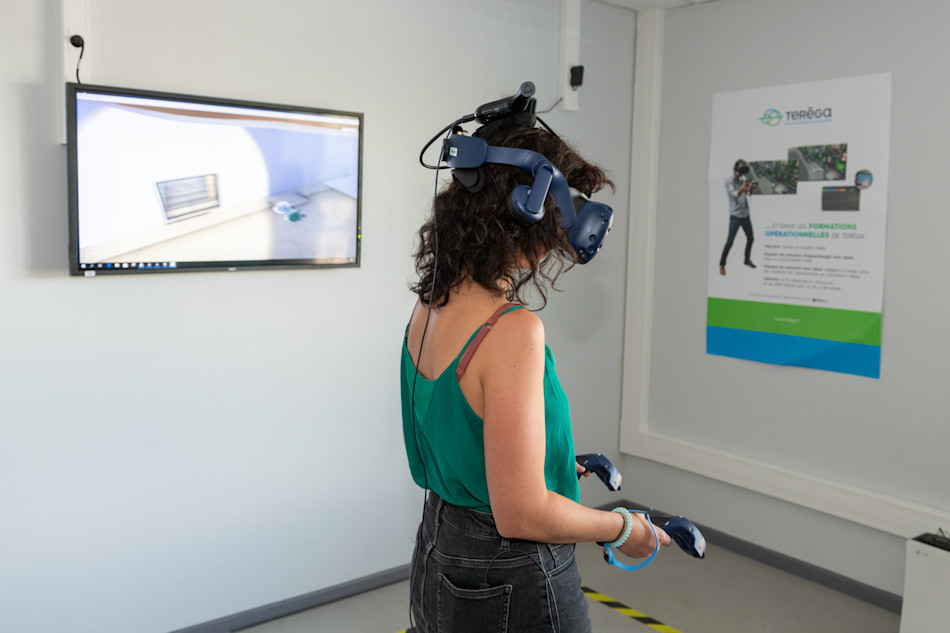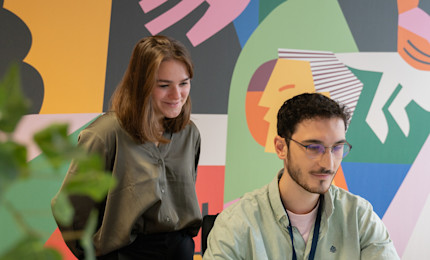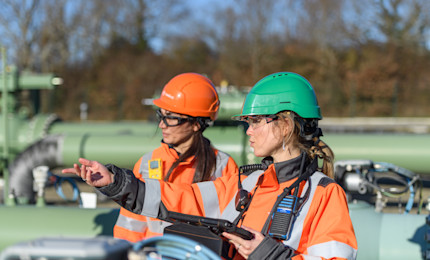Urgence gaz 0 800 028 800

Building your career at Teréga
Teréga signs a long-term partnership with its employees. We are committed to training them throughout their professional career to create a real skills dynamic and build a heritage of knowledge to be shared by all.
Experimenting to grow
The energy market has begun its ecological transition. Transition means change. Jobs in gas are being enhanced by new technological and digital skills that are becoming increasingly sophisticated, in line with technological and environmental innovations. Building a career at Teréga therefore means following a process of learning and constant change.
In order to accompany the changes in the energy market and to develop its employees’ skills throughout their careers, Teréga trains and professionalises them in the field to develop:
their operational skills, which must adapt to changes in infrastructure associated with the energy transition;
their managerial skills via a dedicated in-house programme;
their digital skills thanks to training in new tools;
their interdisciplinary skills to adapt to the new ways of working, encouraging collaborative work and agility
To support the energy transition of its activities, Teréga trains its workers in understanding the characteristics and risks associated with hydrogen, on an H2 awareness bench constructed by its own teams on its Lussagnet site.
Throughout their career, each employee is encouraged to fulfil themselves and experiment with new horizons. They build a personalised career path, taking into account their aspirations and the way they project themselves into the future. They can rely on their managers and peers to identify their talents and plan their career development at Teréga.
The Learning Experience at Teréga
The Teréga Learning Experience is:
a professional experience: where each individual is committed from the very start, invested, given autonomy in their learning, and benefiting from an environment that favours their development;
a digital experience: offering a safe space for experimentation where people can learn by doing, make mistakes, and become self-sufficient in their assignments;
a social experience: by supporting learning by and with their peers, sharing knowledge.
The teaching solutions put in place by Teréga are a reflection of those principles, taking into account the specific characteristics of our activities and our culture. They are:
Individualised: favouring autonomy and career personalisation
We believe everyone should be an actor in their own career. A digital platform thus allows them to manage their own career development. They can view the training courses adapted to their desires and needs, be aware of the possibilities of internal mobility and have access to support for guidance in building their career. Each employee invests independently in their training path, whether it be diploma-based training or additional micro learning or rapid learning courses.
Realistic and innovative to enable training in near real-life situations
The learning methods favour experimentation in order to acquire the required autonomy for missions. Mooc (Massive Online Open Course), Cooc (Corporate Online Open Course) or Spoc (Small Private Online Courses) offer multiple learning possibilities that adapt to the needs of each individual, while virtual reality offers training in situations that are as close to reality as possible.

Encouraging sharing to build a shared and intergenerational portfolio of skills
Few external training courses prepare people for jobs in gas transport and storage or jobs in the energy transition. This is why knowledge sharing is key to fostering learning. Every in-house specialist can become a trainer for their colleagues. For example, we have implemented a principle of companionship on technical positions, according to the recognised methodology of the AFEST (Action de Formation en Situation de Travail). This on-the-job training allows for training in technical actions while creating a link between new arrivals and the longer-established employees, thus encouraging the transfer of knowledge from one generation to another.
In addition, in new jobs such as those associated with the energy transition, training solutions are sometimes limited, or even non-existent. It is sometimes necessary, therefore, to create our own training environment (such as the creation of an H2 bench to provide in-situ training on hydrogen risks), or to encourage meetings between specialists.
We are convinced that, looking beyond training, skills can be gained through experience in the field and exchanges between peers.








